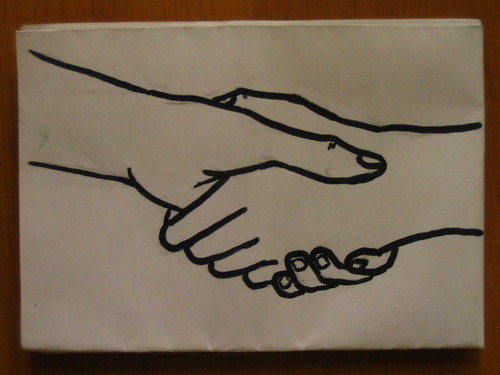 It's almost 2009 and with any luck, you've got exciting plans for the evening's transition into morning. While you're out and about, you can take advantage of an advocacy opportunity. That's right folks, even social situations are perfect advocacy opportunities.
It's almost 2009 and with any luck, you've got exciting plans for the evening's transition into morning. While you're out and about, you can take advantage of an advocacy opportunity. That's right folks, even social situations are perfect advocacy opportunities.The opportunity for New Year's Eve is shaking hands. You'll probably have a chance to meet some new and interesting people while you're out reveling and all you have to do is shake hands and introduce yourself.
Sample:
Friend: "I'd like you to meet my colleague, Stran Ger."
You: "Hello Stran, I'm {insert name}."
hand shaking
Stran: "It's nice to meet you. What do you do?"
You: "I'm a scientific researcher."
And you've done it!
I'm not trying to be too basic here, but it really is as simple as that. As funny as it seems - since you've probably had some version of the above conversation a million times - it is an important advocacy tool. In a national survey, 75% of Americans couldn't name a living scientist. That's three-quarters of the population that claims they don't know a scientist.
Based on the National Science Foundation's 2008 Science and Engineering Indicators, 4.2% of the U.S. workforce are in S&E occupations and an additional 40% of R&D workers are found in non-S&E occupations. Even with all the unofficial tallies of scientists and researchers working outside traditions S&E careers, in America alone, about 1 of every 25 people is a scientist of some kind.
Assuming that every American knows 100 people - not necessarily friends, but knows the names of at least 100 people - they should be able to name at least one of the (statistical) four scientists they know in a phone survey. But they can't, because most of the time, they have no idea that they know a scientist.
Computer scientists, engineers, doctors, biologists, academicians, researchers, you're all out there. It's time your friends and neighbors know who you are.
The public (and policymakers) support things that they know and understand. People support causes they can get behind or that they feel affected by (think: families that support specific disease-related charities). If the public knew that they knew more scientists, public support for science would improve from coast to coast.
Take your opportunity to help make that happen by introducing yourself as a scientist while you're out ringing in 2009 tonight. Consider it an easy New Year's resolution.

